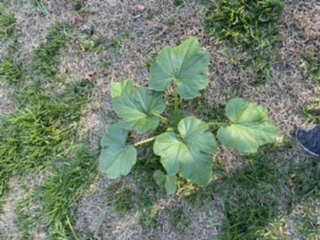
Can you help identify this plant growing in full sun randomly in different spots of his yard. Zone 8, Texas. Is it a weed or safe as he has a young child who plays in the yard.
Thank you for sending in your plant identification question. Unfortunately, the photograph is not clear enough for a positive identification. The leaf shape looks like something in the squash family, but it is difficult to see if the leaf surface is smooth or prickly. If its is a squash, zucchini, or melon it would have flowered by now. The leaf shape looks wider and shorter than any Elephant Ears, or Colocasia, Alocasia or Xanthosoma species. The leaf margins, or edges, in the photograph appear to have sinuses- or cut in bits, which is not typical for Elephant Ear plants. The sinuses may also be part of leaf lobes- also not typical.
The leaf of Elephant Ears are an elongated heart shape with a ruffled edge of varying degree. Across the three main types of Elephant Ears, the leaves are often smooth but some Colocasia have a rough leaf surface. I have researched Asian and American species and this leaf shape seems to be consistent- through the huge range of Colocasias, Alocasias and Xanthosomas- all commonly known as Elephant Ears.
I recommend that you contact the Texas Master Gardeners. This may be a plant that they are familiar with in your State. I have included a link below.
Another option is to contact your nearest Botanical Garden. Many Botanical Gardens offer plant identification services. They may request that you bring in a fresh specimen of leaf and stem. Digging up a small plant would also be useful for tuber or root identification. Elephant Ears have a swollen underground stem, or corm, which will be easy to identify. The specimens should be sealed in a plastic bag to prevent spreading of plant diseases- even if the plant looks healthy. You should also wear gloves and clean your gardening tools in case this plant turns out to contain toxins or irritants.
https://mastergardener.tamu.edu/

